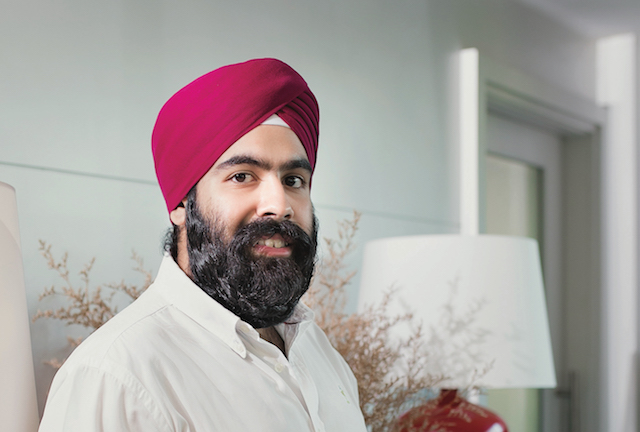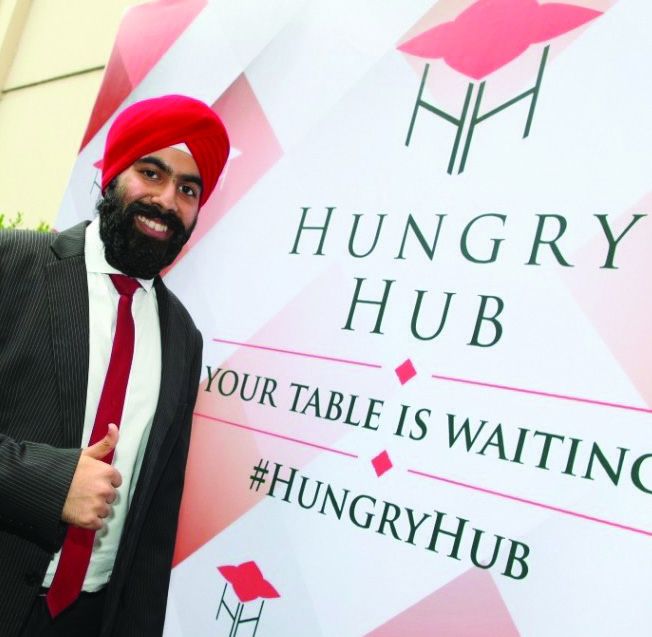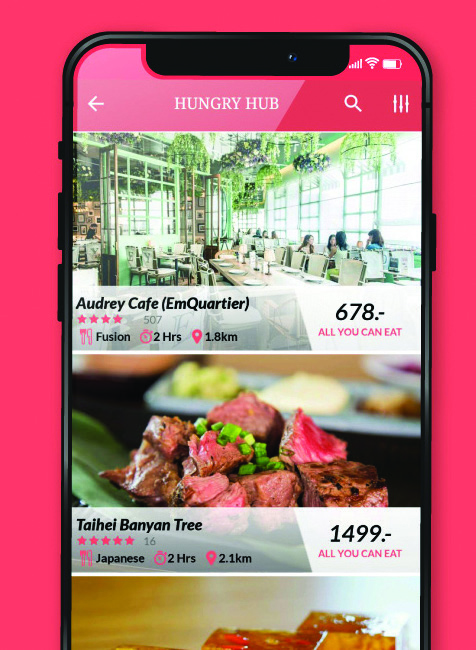Hungry Hub CEO and Co-founder Surasit (Manveer) Sachdev proves that your attitude determines your potential for success.
By Christy Lau
Entrepreneurial success comes in many forms, and everyone has their own ideas about what exactly that entails. But the one thing that every experienced businessman will agree upon is that every successful person has failed at least once in their life. While many still view failure as an end-of-the-world scenario, there are others who understand that is merely a stepping stone to bigger and better things.
Such is the case with Surasit (Manveer) Sachdev who has developed an app that puts customers (yes, that’s you) first. Combining the best of both worlds, Hungry Hub is a dining offer app that allows you to book all-you-can-eat deals, where you can pick an unlimited number of dishes from an exclusive menu that brings together some of the restaurant’s signature à la carte dishes. Diners can enjoy value for money that comes with all-you-can-eat packages, without waiting in long queues or letting the food get cold.
Although Hungry Hub continues to grow in popularity, things were not always smooth sailing. Initially an online restaurant reservation app, Hungry Hub underwent a huge re-tooling when things didn’t pan out as planned. But where many would have chosen to give up, Surasit pushed forward by going back to the drawing board and trying to figure out where it all went wrong. Instead of letting failure own him, he took control of the situation and came up with the app’s current concept, which has put him onto the path to success. His recent trophy in the Start-Ups category at the first ever Thai Indian Youth Achievement Awards (TIYAA) is indicative of the kind of impact his work has had.
A born problem solver, Surasit’s entrepreneurship journey proves that failure isn’t the end but rather the beginning. Masala shares his story on how he created every foodie’s new favourite app.
What pushed you to become an entrepreneur right from the get-go?
My family background played a huge factor, as both my parents were entrepreneurs. After moving through the corporate world first as a Project Manager for Standard Chartered Bank in Bangkok and then in Singapore for two years, I realised that you work more for the bosses rather than creating any valuable impact for the customers. I also wanted something more challenging, so launching an app that was based off a fresh idea, and moving it from nothing to something that creates a positive difference in people’s lives felt more like the right fit for me.
Did your passion for gadgets and technology also lead to the creation of Hungry Hub?
When I was 17, I used to run my own blog, featuring the latest tech launches. I’ve always been amazed with technology’s ability to help improve people’s lives. When it’s digital, you can do things across borders with more scalability. Some of the top companies in the U.S. are tech-based, whereas 30 years ago, it was all oil and gas ventures. That is why I wanted to start an online business, as there is more opportunity for growth and it is easier to build a customer base.
Why did you originally create a restaurant reservation app? Was there a particular experience that led you down this path?
My family is in the hotel business, so I always knew it was a potential career path. Six or seven years ago, I was looking at online hotel booking apps as a possible option, but I soon realised that it was very competitive.
So then my attention went to restaurants, because I’ve always been a foodie from a very young age. There is a restaurant reservation app in the U.S. called Open Table that didn’t exist in Asia yet, so I decided to fill in that gap. I got my MBA from Sasin Graduate Institute of Business Administration and formed my team, but unfortunately I made the mistake of not researching properly. I was asking restaurant owners whether they would use the app, but the question I should have been asking was whether diners would use the app.
The reason why it worked well in the U.S. is because there is a lack of restaurants, which isn’t a problem in Thailand. A new eatery opens every day here, so the issue is more about filling the seats than booking.
So how did you come up with the second version of Hungry Hub?
After two and a half years in the game, I realised that restaurants needed help bringing in customers and maintaining their loyalty. Currently, there are many unsustainable ways of attracting new business. This includes discount apps which aren’t a long-term solution, as the psychology of the customer becomes “I’ll only go back if I get another discount.”
After speaking to a lot of restaurants, I realised that they prefer hosting big groups and corporate diners. But corporates work on a budget when choosing restaurants. So then I thought, why not take existing menus and get them to create special buffet selections. The price is a little higher than normal, but you can eat as much as you want and you have two hours to enjoy it all.
We soon found that not only do customers return to our app to look for the next best deal, but a lot of them who tried the restaurant for the first time came back to enjoy what they liked in à la carte style, since they can’t afford to eat buffets all the time. We are actually providing real value to both and that is why we continue to grow.
However, relaunching the app was a huge risk at the time, so what motivated you to push forward?
We were at the point where we had nothing to lose. The all-you-can-eat idea was our very last chance. If it didn’t work, we were going to stop.
The support of my team and my family was the main factor that helped me push forward. In any start-up, you have to have the mindset that success takes years to reach. If you look at any company, whether it’s Uber, Grab or Facebook, it took at least five or six years before they could call themselves successful.
At first glance, an all-you-can-eat deal doesn’t seem very cost-effective for restaurants. So how did you sell this concept to them?
Initially, it was very difficult even though I had a network of 200 to 300 restaurant partners. We were rejected several times as many of them thought it was too risky. It was primarily a mindset shift, where I had to use numbers and data to prove the benefits. So when one restaurant tried the app, I showed the others their success story. Now we have 130 to 140 restaurants onboard covering all kinds of cuisines.
What are some of the challenges of starting a business from scratch?
Everything is a challenge, especially if you’re new to it. From registering a company to forming a team and creating a culture, you soon learn that you have to make all the mistakes first. You can’t learn from other people and even if you ask them, they wouldn’t have faced the same situations as you. The only element that can help new founders is having knowledgeable people in the industry to help you speed up certain business processes.
What is the future of Hungry Hub?
The dream is to expand but you don’t know what is going to happen tomorrow. For now, we are going with the flow. We want to keep growing the number of restaurants and making sure our customers are happy. Our app currently has a high rating and we would love to maintain that.
You are also a founding member of Sasin Entrepreneurship Center (SEC). How did that come about?
When I was studying at Sasin, I was competing in global business plan competitions, which were part of the curriculum. Now that I am running a business of my own, I wanted to share my personal experience with future generations. I teach professors as well as students who want to get into the start-up scene. We run programmes and events for start-ups, including accelerated programmes to help new businesses grow by utilising our network of connections.
As a professor, what is some advice you could give to someone who wants to launch a start-up?
I honestly feel like entrepreneurship is the future because a lot of jobs are soon going to be replaced by robots and artificial intelligence (AI). Nowadays, it’s more about having the creativity to solve problems that exist around us, because that’s what a machine can’t do. Even if you don’t get into the start-up world, you have to be aware of new technologies to stay relevant. For start-ups, be very clear with what you’re dealing with, especially before you enter the space. Talk to a lot of people who have done it before and get their advice. Make sure you’re solving a real problem that has long-term value.








